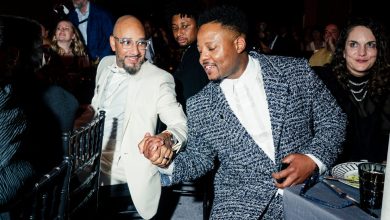Was She Just Another Nicely Packaged Pain Delivery System?

I was 67. She was 67. Knowing as much as she needed to know about white wine, she had not joined the class until the talk turned to reds. I had been there through the talk about whites and the sessions on bubblies. Now I was ready for red.
I had joined the class to help an ailing and mostly housebound friend who needed stimulation, thinking the outings would be good for her, but on this night my friend was sick, so I went alone.
After entering the school building where the class was held through an unfamiliar door, I became lost within seconds in the maze of corridors that students somehow negotiated every day. I wandered, becoming more and more distressed at every false turn, looking for but not finding the room in which the wine class was held.
And then I saw her: this gorgeous woman, beautifully dressed in a stylish raincoat and elegant boots, striding down the hallway, purposeful, sure of herself, her short white hair spiked with purple. I felt certain she was headed to the wine class, so I stopped her to get directions. She told me which right, then left, then right, to take. Then she said, “You don’t remember me, do you?”
“Sara!” I said, suddenly recognizing her as someone I had met years before at a party.
She ducked into the restroom, and I followed her perfect directions to the classroom.
After the teacher’s talk, the class dispersed to a local wine shop for palates-on instruction. Sara and I connected as we tasted, discovering our mutual love of red wine, of opera, of late-night movies and gardens.
The class ended, but Sara and I continued to meet for the occasional dinner or coffee. We even talked about seeing an opera in New York when the Met opened its season in the fall.
One afternoon, when we had agreed to meet, Sara was late. I was in the coffee house, looking out the window, eagerly. I thought I saw her coming, and my heart rose. I realized it was not her, and my heart sank.
Such excitement followed by such disappointment — what could it mean? Only one thing: I woke up to the fact that I was falling in love.
I was terrified. I did not consider myself to be a candidate for love. I was damaged goods, discarded some years earlier by my partner of 17 years, who left me for a younger woman. “Judy!” cried my friend, Ron, when he heard of the betrayal. “It’s as bad as a man!”
I had gotten the message: I wasn’t lovable and didn’t deserve to be treated well. From the carnage, I had also deciphered another message: I had trusted her completely and been utterly mistaken.
I thought I knew who would be faithful and true. Wrong. I thought I knew who would be good for me and to me. Wrong again. I thought I was a person capable of keeping a long-term relationship going. Again, wrong. In the matter of intimate relationships, it was obvious that I couldn’t be trusted to choose wisely or well.
My forays into the world of Match.com and Lesbian Lovefinder had only reinforced my sense that intimate relationships were no longer possible for me. If I felt even the slightest stirring of attraction, I flinched, convinced I had encountered yet another nicely packaged pain-delivery system. I couldn’t trust others and I couldn’t trust myself.
Since my first summer camp, I had been in love with someone. Now, in my seventh decade, I looked on love as a danger zone and felt safer being alone, prepared to live in the land of lost loves for the rest of my life.
I had glimpsed this land some years before in a painting hanging in the dining room of a bed-and-breakfast in Stratford, Ontario. As I sat eating breakfast, I looked up to see a painting of a large and gloomy scene of the Alberta prairie, field brown and sky gray. In the middle of the field was a tree stump with an ax embedded in it. At the edge of the painting stood a rooster, gazing at the stump.
“Does this painting have a title?” I asked our host.
“‘Lost Loves,’” he said.
The land of lost loves, no hens left, stretched before me as well. But then I met Sara, and Sara was different. I had never met a person of such integrity. This attracted me. As did the way she scrunched up her face when she laughed, and the slight Southern accent I could hear when she talked about Ida Reds, the only apple she would use for making applesauce.
I wanted to propose that we move into a more intimate connection, but I feared acceptance almost as much as rejection, sure that my brittle body would break into hundreds of tiny pieces if I ever touched someone again as a lover.
Besides, what if I were to propose a more intimate connection and she was not interested? Would I lose her as a friend? I did not want to offend her.
I began to identify with the good man in Jane Austen’s novels, the one who would never put a lady in the awkward position of having to reject him if she did not return his affection, so he never approached anyone until he was certain his affection would be returned. Since ladies, however, were trained never to show their affections until approached by a man, courtship proved to be a difficult dance indeed.
My own dance was equally difficult. I searched for signs that Sara might share my feelings so that I might speak of my growing affection for her.
We spent a delicious afternoon visiting a garden in Beacon, N.Y. Halfway through our tour, we found a tree house and climbed into it, then lay down on the benches provided for resting. In that intimate and somewhat romantic setting, I made a stab at relationship talk.
“Sara, who would you say has been the love of your life?”
“Why,” she said with a slight drawl, “I guess I would have to say my cat, Bo.” She scrunched up her eyes, this time to stifle a laugh.
I wanted to say, “Try me!” But I didn’t dare.
Inwardly, I churned. Outwardly, I obsessed. I asked friends with whom we socialized if they thought Sara might have a romantic interest in me. No one could find any sign of her feelings toward me, positive or negative. Of course. Sara was also channeling Mr. Knightly.
We were at an impasse. Sharing my frustration with my very best friend, who had heard it all before, many times, I provoked her into venting. “One of you,” she announced, “is going to have to do something. It’s getting boring. Butch up, baby, and tell her how you feel.”
I began to write a letter to Sara. I told her of my admiration for her, of my attraction to her, of my interest in exploring a romantic relationship with her. I asked if she might share that interest. I wrote and rewrote, and friends read and reread, and then I wrote some more.
I wanted to be clear about my feelings, but I had to give her a graceful way to refuse my invitation. Finally, more than a year and a half after that evening in the red wine class, I put the letter in the mail, drove to the airport and flew to Milwaukee to visit my brother.
“Jangled” did not begin to describe the state of my nerves as I contemplated the possible consequences of having spoken. Doing some simple yoga stretches the first morning of my visit in an effort to manage my stress, I heard a pop in my lower back. I was flooded with pain, then realized I couldn’t get up without help. The local urgent care center provided oxycodone and the advice to get an MRI as soon I got home.
When Sara called that evening to say “yes,” I was delirious in more ways than one.
I did not expect to find love again, and certainly not so late in life. Experts on aging trumpet falling as our greatest danger. But what about the danger of not falling?
Of course, my skin will go to bumps and scabs and brown spots, and of course my hands will cramp with arthritis, but if they are clasped by Sara’s own, I can face whatever comes.
Judith Fetterley is a writer and master gardener in upstate New York.
Modern Love can be reached at [email protected].
To find previous Modern Love essays, Tiny Love Stories and podcast episodes, visit our archive.
Want more from Modern Love? Watch the TV series; sign up for the newsletter; or listen to the podcast on iTunes, Spotify or Google Play. We also have swag at the NYT Store and two books, “Modern Love: True Stories of Love, Loss, and Redemption” and “Tiny Love Stories: True Tales of Love in 100 Words or Less.”





